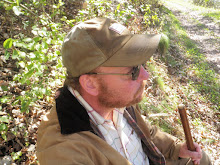Closer to your food
Some recent experiences have led me to a string of thought regarding modern man, the ease of living, detachment from nature and essence.
In trips around to local parks, state forest lakes, and etc. I have noticed a decline in the ability for people of all ages to fish properly. I am not talking about flyfishing, but simply the ability to bait a hook, choose a bobber, cast into water deep enough to hold panfish, and have the patience and attention span to catch a fish. I have observed Dads teaching youngsters where the Dad was as clueless as the child. Funny. Anglo Saxon European immigrants to America have become detached from the sources of food so badly that they often don’t know what brussel sprouts look like in a garden. Food comes in a plastic package. Meat comes from the burger joint. Who is fishing? African Americans, Latinos, Laotians, etc. Because of more recent immigration, relative poverty and traditions and cultural values not yet washed away by our plastic cancer society, they live closer to their food.
Therefore, our own affluence and fast paced society has led to a decline in hunting, fishing, outdoor sports, and home economics. People no longer know how to sew, to cook, to can, to preserve food, to prepare wild game. My cousin Meggie has recently really become involved in organic gardening. Her vast garden is planted with veggies and herbs. She has started planting pre-Columbian beans and other vegetables that have not been genetically modified to taste like rubber bands. She says the difference between store-bought vegetables and those fresh out of her garden is like night and day. Although I don’t have a garden, I do haunt farmers markets every summer and fall, and eat as much raw whole food as I can, as well as stewing the veggies into pasta sauces and freezing them.
I actually have friends that don’t know how to cook anything. They eat at fast food joints when not subsiding on sandwiches or grilling out.
So traditions are dying. So what? Progress is good, right?
Well, the collapse of financial system, peak oil, global warming, etc. should show us that perhaps we should live closer to our food. The average piece of produce in the supermarket now travels over 1,500 miles to its destination. The largest portion of its price is dedicated to fuel cost for transportation. Imagine how much less greenhouse gasses would be emitted if we lived closer to our food. Only a generation back, both my mother and father had family gardens. Dad’s family built a smokehouse, and his grandfather homesteaded in British Columbia. Mom’s family of ten children were fed out of the garden. Homemade horseradish and sauerkraut were made. Apple cider was produced, home made cheese, home made rootbeer, and home made wine too.
Of course, our fisheries can’t support a constant kill-it-and-grill-it mentality, but we need to teach our children how to catch a panfish, clean it, get your hands dirty, and eat it for supper.
Fishing is part of the joy of nature, and an excellent way to begin to respect the resources we have. Tomorrow’s stewards of the environment may be sitting at the gaming console and eating fried chemicals.
When we forget where our food comes from, we lose a piece of our humanity.
That doesn't mean we all have to become mini-Thoreaus, nor vegans that won't eat anything that casts a shadow. We tend as a society to always take things too far in our personal search for identity. A small step toward buying from local farmers, eating a gamefish we caught, or a fresh tomato from the garden will begin to erode our throw-away society, and allow the future generations to carry on a tradition of appreciating natural things.
Subscribe to:
Post Comments (Atom)









No comments:
Post a Comment
Comments by interested readers are welcome. Back links to non-topical (spam) websites will be treated as spam and deleted.